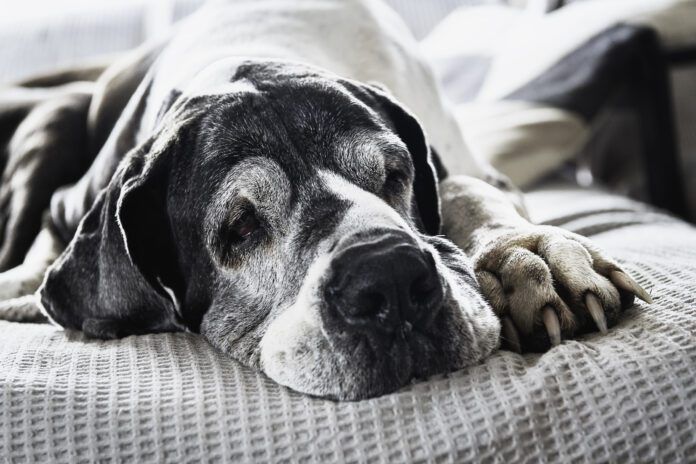As dogs age, their nutritional needs and dietary preferences may change. Dog food recommended for senior dogs is usually soft, wet, or canned. The wide variety of soft foods on the market makes it easy to find one to fit your senior’s specific needs, as you will see here. The higher aroma of wet foods, which can be increased if you warm the food a bit in a microwave, may get your old friend chowing down the way he used to eat.
Soft dog food is great for senior dogs because, compared to dry foods, it offers:
- Ease of consumption
- Higher palatability
- Hydration
- Increased digestibility
- Stronger aroma
Soft food does, however, come with the drawbacks of a higher cost, refrigerated storage, and a short shelf-life after opening it.
Variety of Formulations
Canned food comes in multiple formats, from patés to chunks in gravy and is formulated to meet every life-stage, from puppies to seniors. These formulations use a variety of different protein sources, from conventional proteins like chicken and beef, to novel protein sources, such as venison and rabbit. Veterinary formulations are also available for dogs who need specialized nutrition for health reasons, and there are foods formulated specifically for senior dogs.
Old Dog Dental Issues
Canned food is often easier for senior dogs to chew and digest compared to dry kibble. As dogs age, they can experience dental issues or reduced jaw strength, making softer food a more comfortable option than dry, hard foods.
For seniors with dental issues, eating hard food can be painful and may lead to reduced food intake. Often, dental cleaning or tooth extractions are needed to solve the problem, but feeding wet food can help provide some relief to your pet in the meantime.
Canned Food Is More Appetizing to Dogs
In addition to being easier to eat, soft food may be more palatable due to its higher moisture and strong aroma. As dogs age, a decrease in their sense of smell can have negative impacts on their appetite. For dogs that have diminished appetites, or are historically picky eaters, selecting a strong-smelling food, such as a canned diet, may help entice your senior at mealtimes.
Benefits of a Wet Food
The higher levels of moisture in canned foods are not only beneficial for palatability, but also for hydration. Senior dogs are more prone to dehydration than their younger counterparts, so providing moisture during their mealtimes will help ensure they have the water necessary to maintain healthy bodily functions, including supporting kidney and urinary health.
Canned Food Is Gentler
Canned dog food can be gentler on the digestive system than conventional kibble, which is advantageous for older dogs with sensitive stomachs. Wet foods typically contain higher inclusions of meat ingredients, which are protein-rich and highly digestible. High-quality protein sources are important, especially for seniors who often struggle to maintain lean muscle mass. Finding a canned food that is formulated specifically for seniors can also provide additional benefits for our aging companions, as senior formulas are often enriched with nutrients to support joint health, decrease inflammation, and promote digestion.
Downsides of Soft Dog Food
Despite all the pluses to feeding soft food to senior dogs, there are some cons. Canned dog food generally has a shorter shelf life compared to kibble, especially after it has been opened. Proper storage and refrigeration after opening are necessary to prevent spoilage. This can result in increased food waste if your dog does not consume it quickly enough.
Feeding a diet of only soft dog food is more expensive than feeding kibble, which may make it cost-prohibitive, especially for those with multiple pets or large breeds. Because of the water content present in canned foods, the volume you need to feed to meet your dog’s energy and nutrient requirements is much higher than that of a dehydrated diet.
If your older dog—or any dog—stops eating, be sure to consult with your veterinarian to be certain he isn’t ill. And, while you’re there, talk to your veterinarian for help determining the best diet for your senior dog and their health needs.







Our recently adopted 5-year-old shihtzu/poodle girl only will eat canned food. We’ve tried to move her to a high quality kibble, mixed in with her canned food, but she just spit the kibble out all around the dish. I’ve even tried soaking the kibble with the same results. On a positive note, we can have the 20-year-old cat’s dry food on the floor next to the dog’s dish and the dog leaves the cat’s food alone.
I get around all the downsides of wet food by adding a drizzle of buttermilk to the dry food. After it soaks a bit, she eats it.
For my 14-year-old chow/Golden mix, Roxy, I mix in about 1/3 cup of canned food with her kibble. Keeps the cost down and makes it easier for her to eat because she’s missing some teeth.
My dogs don’t do well with canned dog food ( probably the agar-agar and/or carrageenan). So to get the advantages without the disadvantages I take the appropriate amount of kibble per meal and grind it up in a food processor until it’s almost powder. Then I add a lot of warm water (8- 12 oz depending on which dog) to make it the consistency of wet oatmeal. I can adjust the water if they need even more hydration. It must release a great aroma because I did this with one dog after dental surgery and the other dog made it really clear that he wanted his this way . I have been doing it this way for both dogs ever since.
I’m surprised dehydrated or freeze dried dog food wasn’t recommended. I feed Honest Kitchen which, when hydrated, is the consistency of oatmeal. If I add more water it’s more like a soup. Its ingredients are human grade and my dog LOVES it.
My toy poodle, 12 year old, is doing great with some kibble (usually Orijen) in the morning and canned food (Terra Canis, loves it) 12 hours later. Fun fact: if I change the order (canned in the morning, kibble in the evening) he refuses it. Sometimes I soak the kibble with bone broth or just warm water, but he likes it dry too. At the beginning of this schedule (two meals 12 hours apart) I thought that mixing the kibble with the canned food would be a good idea but my vet recommended me to feed them separately. I must add that my doggy has always been a bit underweight and a picky eater.